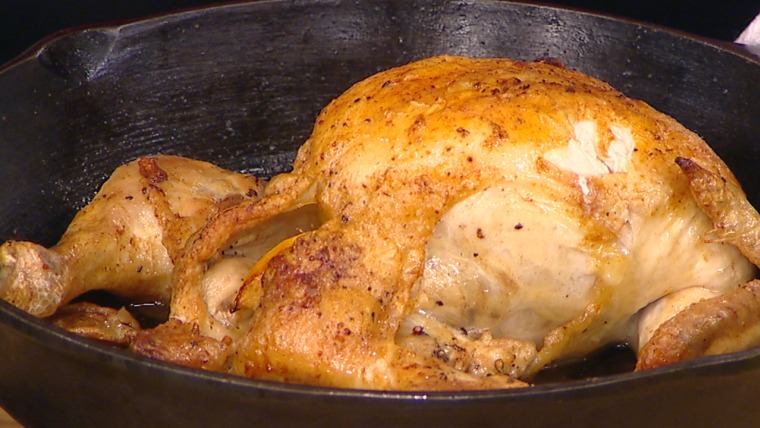How To Clean Cast Iron Pan With Salt
We can't live without our cast iron skillets, and, it turns out, we haven't been making the most of them. Here, Charlotte Druckman, author of the cookbook, Stir, Sizzle, Bake: Recipes for Your Cast-Iron Skillet, shares an easy tip that will take our cast iron cooking to the next level.
To reap the best results when baking in your cast-iron pan, almost all of the time — though there are a few exceptions — you have to preheat it. Although you might be tempted to try, you should not place your unbaked dough on a cool pan and then pop it in the oven. It will likely lead to sticking. I learned this the hard way when I tried to bake a Tibetan-style flatbread, on my stovetop, in my unheated cast-iron skillet. My bread was nearly immovable. The cleanup was misery; my cast iron endured, but not without a rather infuriating effort.

Preheating has a few other invaluable benefits. After all my recipe testing and cake eating, what I've learned is that the skillet's concentrated heat can be an asset for many baked goods. The heat provides that extra caramelization on the bottom of a tart shell, bar cookie, or, which I adore, challah; it helps develop the slightly crunchy crust on cornbread, the almost jam-like roasted fruit topping — once flipped — of an upside-down cake, and it puts bubbly blisters on your naan. A dry hot skillet gives you a blackening char; adding fat to the pan is the way to a nut-brown finish.
RELATED: 6 myths about cast iron pans busted
Placing a small amount of cooking fat down on the hot cast iron and waiting for its temperature to climb not only greases the pan for the optimal "sear," but also helps to build up the skillet's seasoning, which, in turn, protects the pan and increases its nonstick capability. Dave Arnold explains in his indispensable post "Heavy Metal: The Science of Cast Iron Cooking," published on his blog, Cooking Issues, that heat plus an unsaturated fat — of the kind found in some vegetable oils — yields a chemical reaction that changes the fat's molecules to form a polymerized coating that repels water, which makes it nonstick. A new skillet (and sometimes an old one) must be properly seasoned before it's used; when the pan's ready for work, by cooking on it with more fat, you will continue to build upon that layer and increase its hydrophobia.
RELATED: How to season a cast iron pan so you can use it for a lifetime
How to preheat your cast iron skillet
Because cast iron is slower to heat and does so unevenly, preheating, essential for searing, is also almost always recommended for frying, roasting, and baking. You can do this in your oven or, when you're doing a stovetop preparation, on a burner. Ideally, it should be done gradually. This is easy enough in your oven — just put the pan in there while you preheat the appliance.
It's a little more involved on the stovetop, but not much: Start the skillet over low heat, incrementally increasing that to whatever your desired cooking temperature is. Make sure you place the pan an inch or two off center and rotate it every couple of minutes, so it circles the heat source; this keeps the middle of the skillet from receiving all that direct heat and developing a hot spot. J. Kenji López-Alt recommends you give this a solid 10 minutes. If you think your pan is too hot for the pending task, lower the heat, and remember that cast iron is slower to register temperature adjustments.
Reprinted from Stir, Sizzle, Bake: Recipes for Your Cast-Iron Skillet. Copyright © 2016 by Charlotte Druckman. Photos copyright © 2016 by Aubrie Pick. Published by Clarkson Potter, an imprint of Penguin Random House, LLC.
This article was originally published on October 3, 2016.
How To Clean Cast Iron Pan With Salt
Source: https://www.today.com/food/one-thing-you-must-do-when-cooking-your-cast-iron-t103082
Posted by: bauersming1945.blogspot.com

0 Response to "How To Clean Cast Iron Pan With Salt"
Post a Comment